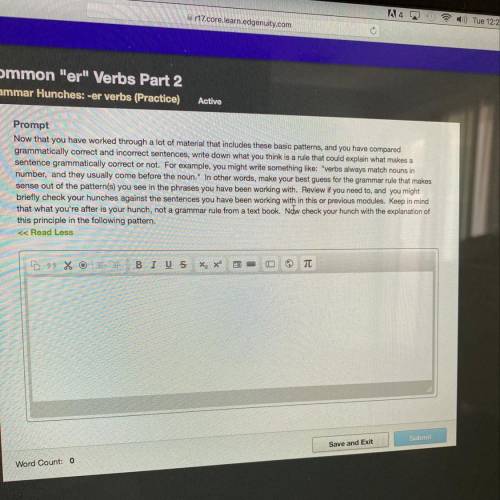
Prompt
Now that you have worked through a lot of material that includes these basic patterns, and you have compared
grammatically correct and incorrect sentences, write down what you think is a rule that could explain what makes a
sentence grammatically correct or not. For example, you might write something like: "verbs always match nouns in
number, and they usually come before the noun." In other words, make your best guess for the grammar rule that makes
sense out of the pattern(s) you see in the phrases you have been working with. Review if you need to, and you might
briefly check your hunches against the sentences you have been working with in this or previous modules. Keep in mind
that what you're after is your hunch, not a grammar rule from a text book. Now check your hunch with the explanation of
this principle in the following pattern


Answers: 3
Another question on Spanish

Spanish, 23.06.2019 03:40
Read and select the best answer. i am often asked, "why do some hispanic people use two last names? " well, in spanish a last name is not called a last name. in spanish, the last name is called an apellido. when you talk about someone's last name, you talk about their apellidos since there are two of them. the two apellidos are referred to as the first apellido and the second apellido. why are there two? well, my husband's first apellido is rodríguez, which is the first apellido (last name) of his father. his second apellido (last name) is pizano, which is the first apellido of his mom (this one is usually called the mother's maiden name in the us). his full name is francisco rodríguez pizano. below is his example: his dad's apellidos were: rodríguez abundis his mom's apellidos were: pizano lópez my husband's full name is: francisco rodríguez pizano
Answers: 1

Spanish, 23.06.2019 20:40
Tengo dos lagartos _[blank]_ en mi casa. which word best completes the sentence? marrón rojas verde negros
Answers: 1

Spanish, 23.06.2019 22:40
1.siempre quiero llegar primero al trabajo. - ninguno quiero llegar primero al trabajo - nunca quiero llegar primero al trabajo - nada quiero llegar primero al trabajo - tampoco quiero llegar primero al trabajo 2.alguien dijo que eso es posible - ningunos dijo que eso es posible - nadie dijo que eso es posible - nunca dijo que eso es posible - nada dijo que eso es posible 3.o voy a trabajar o voy a la escuela - ni voy a trabajar ni voy a la escuela - nada voy a trabajar alguien voy a la escuela - no voy a trabajar no voy a la escuela - nunca voy a trabajar jamas voy a la escuela 4.si, yo también quiero verte - no, yo siempre quiero verte - no, yo tambien quiero verte - no, yo tampoco quiero verte - si, yo tampoco quiero verte 5.algunas personas dicen la verdad -ninguna persona dicen la verdad -ninguno persona dice la verdad -nadie persona dice la verdad -ninguna persona dice la verdad
Answers: 2

Spanish, 24.06.2019 10:00
Which one of the following is not a typical day of the dead activity, as mentioned in the lecture? a. visiting the cemetery c. re-enacting the dead’s life b. praying for the dead d. taking flowers to the tomb of the dead
Answers: 2
You know the right answer?
Prompt
Now that you have worked through a lot of material that includes these basic patterns, and y...
Questions


Mathematics, 27.01.2021 02:00


Social Studies, 27.01.2021 02:00

English, 27.01.2021 02:00


Biology, 27.01.2021 02:00

Arts, 27.01.2021 02:00



Social Studies, 27.01.2021 02:00



Mathematics, 27.01.2021 02:00

Mathematics, 27.01.2021 02:00

English, 27.01.2021 02:00



Mathematics, 27.01.2021 02:00

English, 27.01.2021 02:00



